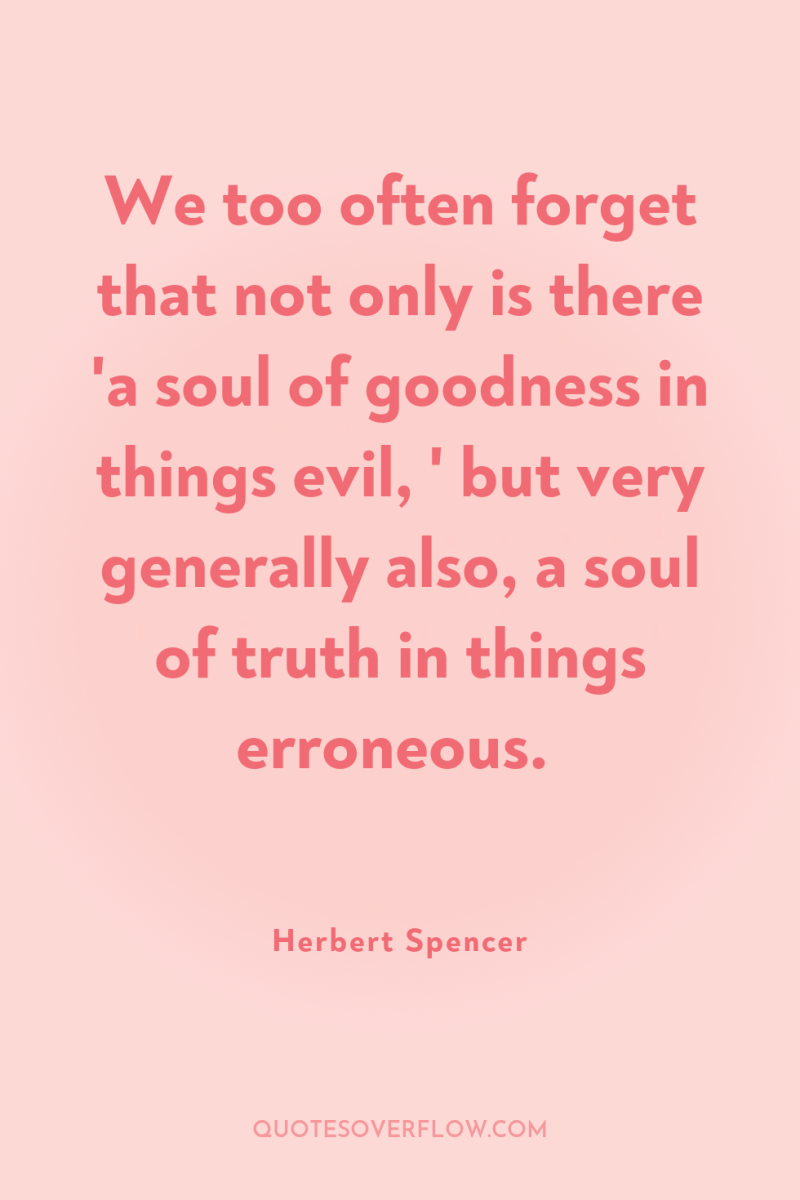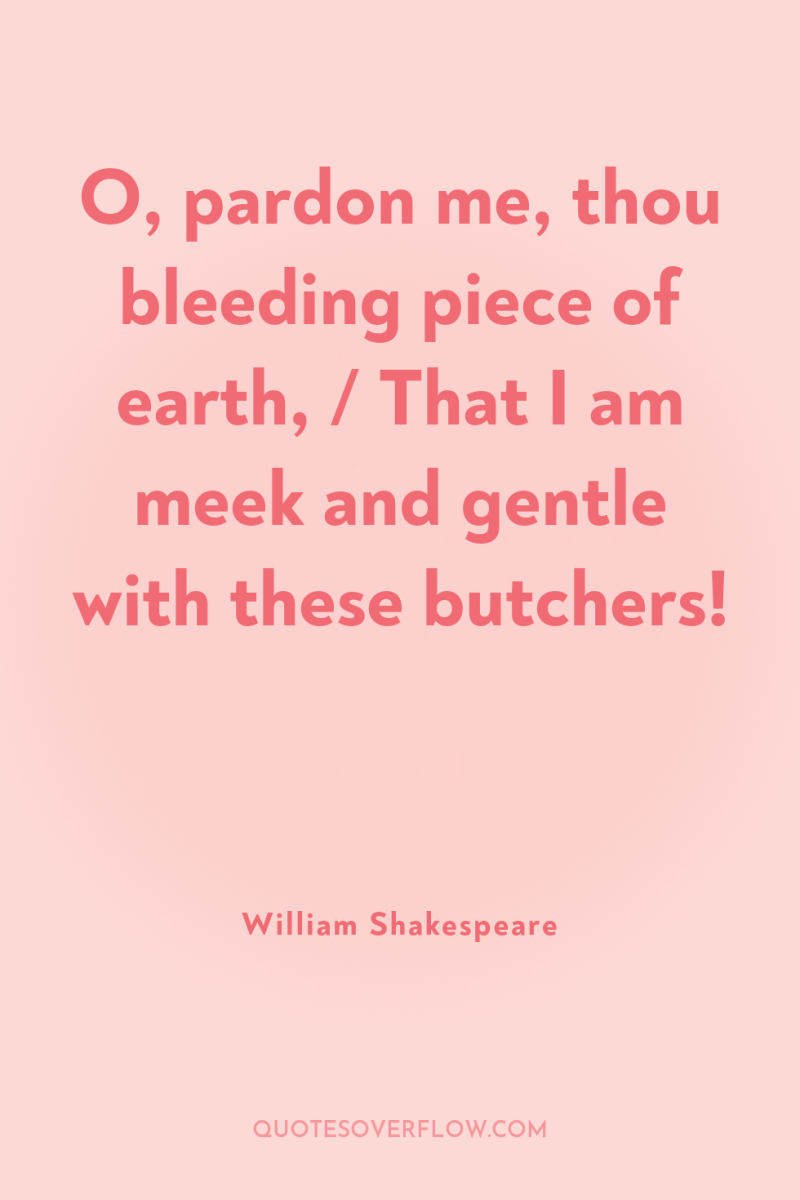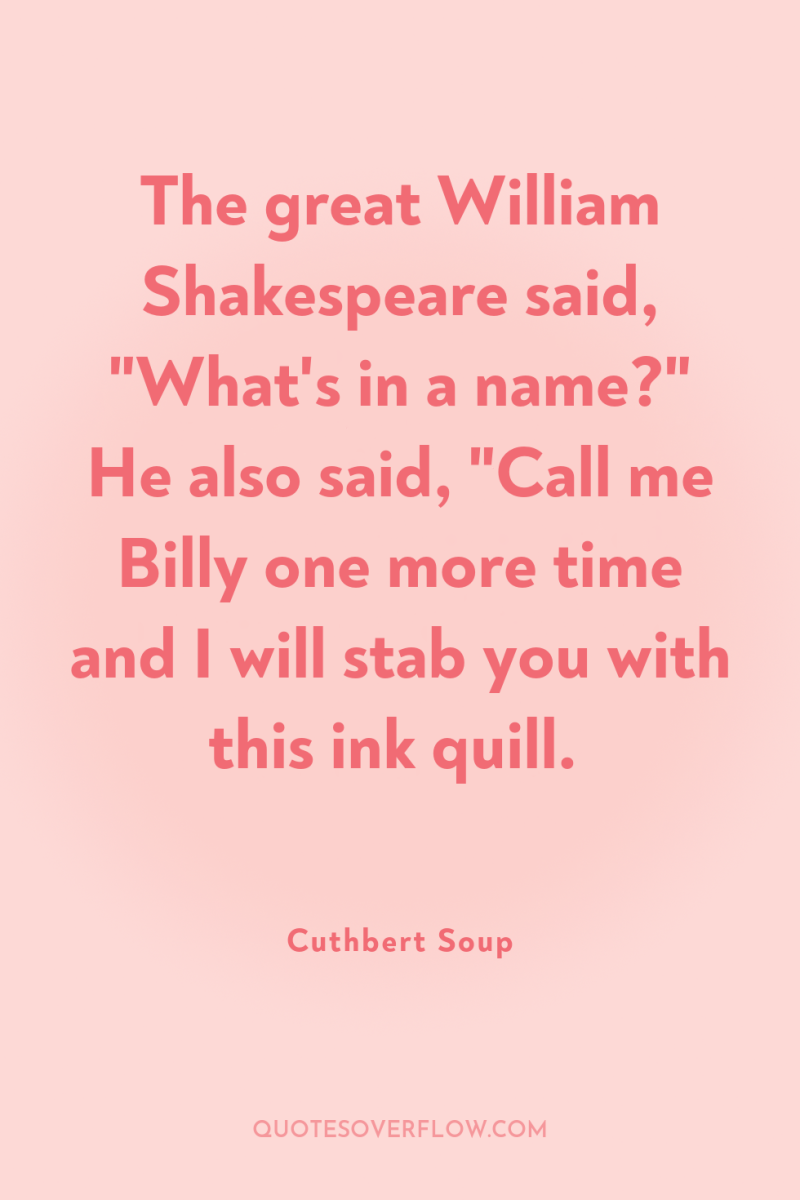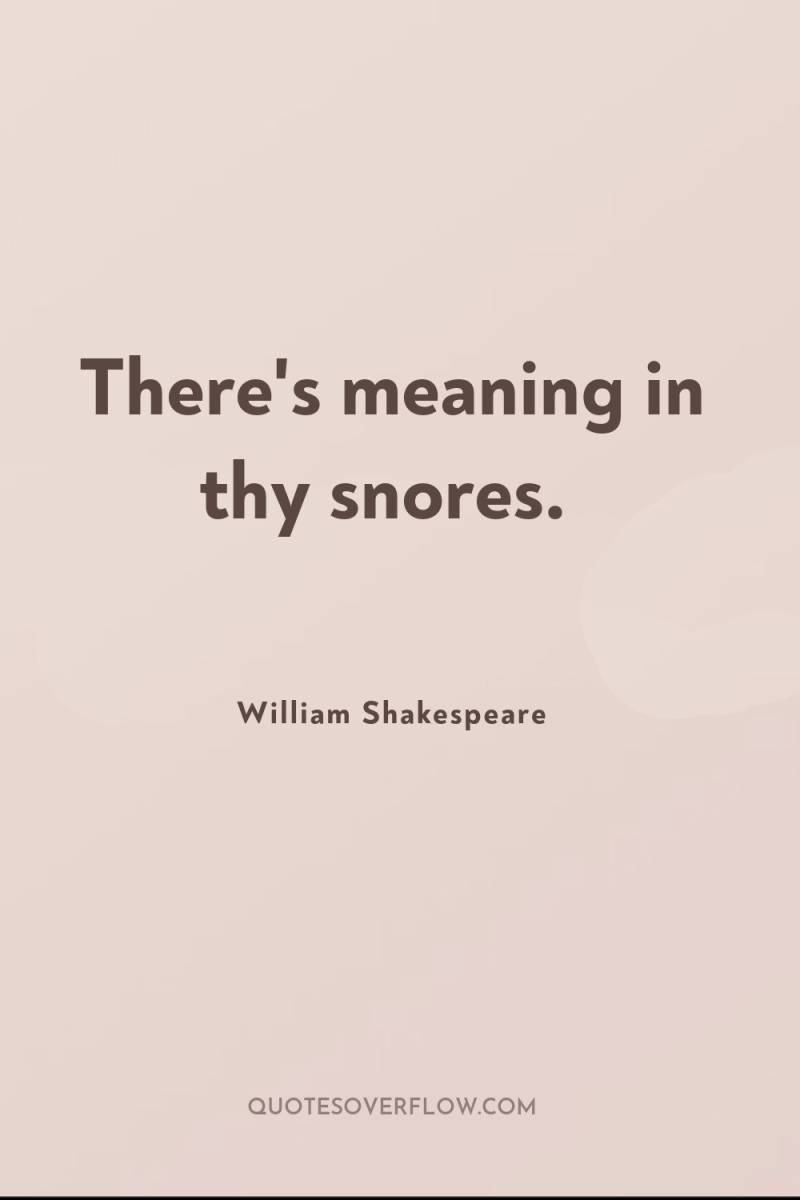
1
We too often forget that not only is there 'a soul of goodness in things evil, ' but very generally also, a soul of truth in things erroneous.Herbert Spencer

2
O, pardon me, thou bleeding piece of earth, / That I am meek and gentle with these butchers!William Shakespeare

3
The great William Shakespeare said, "What's in a name?" He also said, "Call me Billy one more time and I will stab you with this ink quill.Cuthbert Soup
4
The study of mathematics is apt to commence in disappointment... We are told that by its aid the stars are weighed and the billions of molecules in a drop of water are counted. Yet, like the ghost of Hamlet's father, this great science eludes the efforts of our mental weapons to grasp it.Alfred North Whitehead
5
21. Take in a great breath of air and then blow it out. Contained in that single breath were at least three nitrogen atoms that were breathed by every human being who ever lived, including Jesus Christ, William Shakespeare, Winston Churchill, and every president of the United States. This illustrates the fact that everything we do affects other people, positively or negatively. That’s why it is foolish to say, “Do your own thing if it doesn’t hurt anybody else.” Everything we do affects other people.James C. Dobson

6
There's meaning in thy snores.William Shakespeare
7
Where shall we three meet again in thunder, lightning, or in rain? When the hurlyburly 's done, when the battle 's lost and wonWilliam Shakespeare
8
They do not love, that do not show their love.William Shakespeare
9
All the world’s a stage, and all the men and women merely players. William ShakespeareCharmaine J. Forde
10
Well, in that hit you miss. She'll not be hit With Cupid's arrow. She hath Dian's wit, And, in strong proff of chastity well armed, From Love's weak childish bow she lives uncharmed. She will not stay the siege of loving terms, Nor bide th' encounter of assailing eyes, Nor ope her lap to saint-seducing gold. O, she is rich in beauty; only poor That, when she dies, with dies her store. Act 1, Scene 1, lines 180-197 .William Shakespeare
11
We read the pagan sacred books with profit and delight. With myth and fable we are ever charmed, and find a pleasure in the endless repetition of the beautiful, poetic, and absurd. We find, in all these records of the past, philosophies and dreams, and efforts stained with tears, of great and tender souls who tried to pierce the mystery of life and death, to answer the eternal questions of the Whence and Whither, and vainly sought to make, with bits of shattered glass, a mirror that would, in very truth, reflect the face and form of Nature's perfect self. These myths were born of hopes, and fears, and tears, and smiles, and they were touched and colored by all there is of joy and grief between the rosy dawn of birth, and death's sad night. They clothed even the stars with passion, and gave to gods the faults and frailties of the sons of men. In them, the winds and waves were music, and all the lakes, and streams, and springs, –the mountains, woods and perfumed dells were haunted by a thousand fairy forms. They thrilled the veins of Spring with tremulous desire; made tawny Summer's billowed breast the throne and home of love; filled Autumns arms with sun-kissed grapes, and gathered sheaves; and pictured Winter as a weak old king who felt, like Lear upon his withered face, Cordelia's tears. These myths, though false, are beautiful, and have for many ages and in countless ways, enriched the heart and kindled thought. But if the world were taught that all these things are true and all inspired of God, and that eternal punishment will be the lot of him who dares deny or doubt, the sweetest myth of all the Fable World would lose its beauty, and become a scorned and hateful thing to every brave and thoughtful man.Robert G. Ingersoll
12
In fact a favourite problem of [John Tyndall] is– Given the molecular forces in a mutton chop, deduce Hamlet or Faust therefrom. He is confident that the Physics of the Future will solve this easily.Thomas Henry Huxley
13
One day at Fenner's (the university cricket ground at Cambridge), just before the last war, G. H. Hardy and I were talking about Einstein. Hardy had met him several times, and I had recently returned from visiting him. Hardy was saying that in his lifetime there had only been two men in the world, in all the fields of human achievement, science, literature, politics, anything you like, who qualified for the Bradman class. For those not familiar with cricket, or with Hardy's personal idiom, I ought to mention that “the Bradman class” denoted the highest kind of excellence: it would include Shakespeare, Tolstoy, Newton, Archimedes, and maybe a dozen others. Well, said Hardy, there had only been two additions in his lifetime. One was Lenin and the other Einstein.C.P. Snow
14
I like to quote Shakespeare. But in this case, the rapper Eminem said it best: Words are a motherfucker.Jillian Keenan
15
When we set about accounting for a Napoleon or a Shakespeare or a Raphael or a Wagner or an Edison or other extraordinary person, we understand that the measure of his talent will not explain the whole result, nor even the largest part of it; no, it is the atmosphere in which the talent was cradled that explains; it is the training it received while it grew, the nurture it got from reading, study, example, the encouragement it gathered from self-recognition and recognition from the outside at each stage of its development: when we know all these details, then we know why the man was ready when his opportunity came.Mark Twain
16
Alas, my lord, your wisdom is consumed in confidence.William Shakespeare
17
Why, man, he doth bestride the narrow world Like a Colossus, and we petty men Walk under his huge legs and peep about To find ourselves dishonorable graves. Men at some time are masters of their fates. The fault, dear Brutus, is not in our stars But in ourselves, that we are underlings.William Shakespeare
18
A good many times I have been present at gatherings of people who, by the standards of the traditional culture, are thought highly educated and who have with considerable gusto been expressing their incredulity at the illiteracy of scientists. Once or twice I have been provoked and have asked the company how many of them could describe the Second Law of Thermodynamics. The response was cold: it was also negative. Yet I was asking something which is about the scientific equivalent of: Have you read a work of Shakespeare's?.C.P. Snow
19
I understand a fury in your words But not your words.William Shakespeare
20
Seven Ages: first puking and mewling Then very pissed-off with your schooling Then fucks, and then fights Next judging chaps' rights Then sitting in slippers: then drooling.Robert Conquest
21
William Shakespeare: You will never age for me, nor fade, nor die.Marc Norman
22
I'll find a day to massacre them all And raze their faction and their family, The cruel father and his traitorous sons, To whom I sued for my dear son's life, And make them know what 'tis to let a queen Kneel in the streets and beg for grace in vain.William Shakespeare
23
When the devout religion of mine eye Maintains such falsehood, then turn tears to fires, And these, who, often drowned, could never die, Transparent heretics, be burnt for liars! One fairer than my love? The all-seeing sun Ne'er saw her match since first the world begun.William Shakespeare
24
Some are born mad, some achieve madness, and some have madness thrust upon 'em.Emilie Autumn
25
He [Alexander von Humboldt] was to science what Shakespeare was to the drama.Robert G. Ingersoll
26
The love that follows us sometime is our trouble, which still we thank as love.William Shakespeare
27
How sweet the moonlight sleeps upon this bank! Here will we sit and let the sounds of music Creep in our ears: soft stillness and the night Become the touches of sweet harmony. Sit, Jessica. Look how the floor of heaven Is thick inlaid with patines of bright gold: There's not the smallest orb which thou behold'st But in his motion like an angel sings, Still quiring to the young-eyed cherubins; Such harmony is in immortal souls; But whilst this muddy vesture of decay Doth grossly close it in, we cannot hear it."- Lorenzo, Acte V, Scene 1 .William Shakespeare
28
Pour on, I will endure.William Shakespeare
29
This goodly frame, the earth, seems to me a sterile promontory, this most excellent canopy, the air, look you, this brave o'erhanging firmament, this majestical roof fretted with golden fire, why, it appears no other thing to me than a foul and pestilent congregation of vapours. What a piece of work is a man! how noble in reason! how infinite in faculty! in form and moving how express and admirable! in action how like an angel! in apprehension how like a god! the beauty of the world! the paragon of animals! And yet, to me, what is this quintessence of dust? .William Shakespeare
30
The fault, dear Brutus, is not in our stars/ But in ourselves.William Shakespeare
31
The sweetest honey is loathsome in its own deliciousness. And in the taste destroys the appetite. Therefore, love moderately.William Shakespeare
32
O wonderful, wonderful, and most wonderful wonderful! And yet again wonderful, and after that, out of all hooping.William Shakespeare
33
A third...candidate for Shakespearean authorship was Christopher Marlowe. He was the right age (just two months older than Shakespeare), had the requisite talent, and would certainly have had ample leisure after 1593, assuming he wasn't too dead to work.Bill Bryson
34
Shakespeare wrote Moby-Dick, using Melville as a Ouija board.Ray Bradbury
35
Othello is about many different kinds of love: it’s about the light, beautiful side of love, and it’s about the twisted, darker side of love, and it’s about how, if you flip the emotional coin, love can make you do terrible things. (James Earl Jones)Susannah Carson
36
Give me my Romeo. And when I shall die, Take him and cut him out in little stars, And he will make the face of heaven so fine That all the world will be in love with night And pay no worship to the garish sun.William Shakespeare
37
For where Love reigns, disturbing JealousyDoth call himself Affection's sentinel; Gives false alarms, suggesteth mutiny, And in a peaceful hour doth cry 'Kill, kill!Unknown
38
Nernst was a great admirer of Shakespeare, and it is said that in a conference concerned with naming units after appropriate persons, he proposed that the unit of rate of liquid flow should be called the falstaff.J.R. Partington
39
If it were possible for a metaphysician to be a golfer, he might perhaps occasionally notice that his ball, instead of moving forward in a vertical plane (like the generality of projectiles, such as brickbats and cricket balls), skewed away gradually to the right. If he did notice it, his methods would naturally lead him to content himself with his caddies's remark-'ye heeled that yin, ' or 'Ye jist sliced it.' .. But a scientific man is not to be put off with such flimsy verbiage as that. He must know more. What is 'Heeling', what is 'slicing', and why would either operation (if it could be thoroughly carried out) send a ball as if to cover point, thence to long slip, and finally behind back-stop? These, as Falstaff said, are 'questions to be asked.Peter Guthrie Tait
40
Friar Laurence:O, mickle is the powerful grace that lies In herbs, plants, stones, and their true qualities: For nought to vile that on the earth doth live, But to the earth some special good doth give; nor aught so good, but, strain'd from that fair use, Revolts from true birth, stumbling on abuse: Virtue itself turns vice, being misapplied, And vice sometime's by action dignified.William Shakespeare
41
They are near the bottom of the food chain - a meal for fish and birds - while humans eat from the top of the food chain, consuming an astonishing array of what lies on the planet. But eventually, even we become food for the worms. Shakespeare saw this connection, writing in Hamlet, "A man may fish with a worm that hath eat of a king, and eat of a fish that hath fed of that worm.Amy Stewart